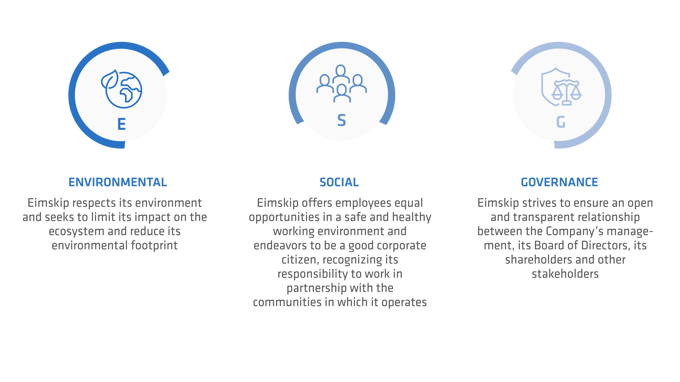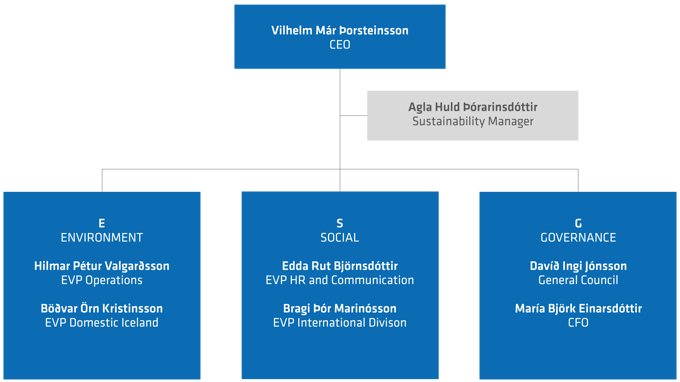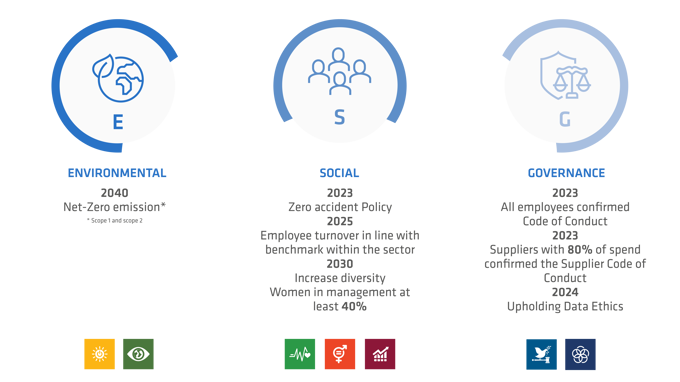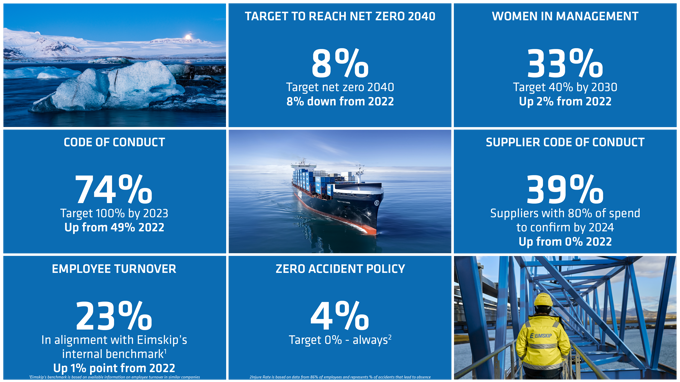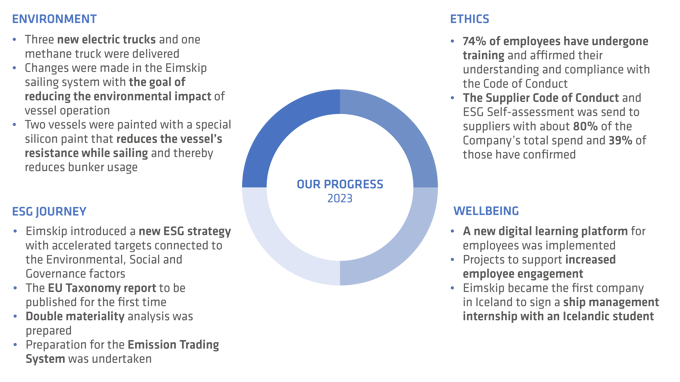Eimskip strives to provide its customers with the most efficient and sustainable transportation solutions combined with outstanding services, all while securing a good return for its shareholders and being responsible for its employees, society, and the environment. As a company, Eimskip aims to contribute to a better and safer society wherever it operates, and responsibility towards the community is an integral part of the Company’s sustainability policy. The sustainability policy is reflected in Eimskip’s global policies that apply to the Eimskip Group.
Eimskip is a registered participant of the UN Global Compact, the United Nations’ initiative for social responsibility for human rights, labor, the environment, and anti-corruption. With its participation, the Company has committed to managing its business operations so that the UN Global Compact and its Ten Principles are a part of the Company’s strategy, culture, and day-to-day operations.
Eimskip’s Sustainability Strategy is based on the Nasdaq ESG Reporting Guide and embraces the Environment, Social and, Governance factors.
Eimskip’s ESG Sustainability Statement for 2023 is available here.
SUSTAINABILITY STRUCTURE
Eimskip’s sustainability work is managed through the Sustainability Policy, which was last updated in 2023. The Company has a governance structure for sustainability-related matters where the CEO is responsible for a strategic sustainability framework, and the issues are regularly reported to the Board of Directors, who also participates in strategic work. Executive Vice Presidents are responsible for specific categories within the sustainability framework: Environment (E), Social (S), and Governance (G). The Sustainability Manager holds the day-to-day responsibility and coordination of the sustainability strategy. The Sustainability Manager reports quarterly to the Executive Management and at least yearly to the Audit Committee and the Board of Directors.
In 2023, Eimskip introduced new targets connected to Environment, Social, and Governance factors. The Company’s sustainability is addressed with a holistic approach, and the plan reflects the commitment to ensure a green transition and, to keep a strong focus on a safe, equal, and inclusive workplace, and a strong value chain.
In 2023, there was an 8% reduction in the Company’s CO2 emissions. The Company did not reach the ambitious goal of zero work accidents, but constant emphasis is placed on safety and health within the Company. The employee turnover rate is 23%, primarily among vessel and warehouse employees. The number of women in management has increased from 31% in 2022 to 33% in 2023, but a strong focus has been on leadership programs with equal participation of women and men. The Code of Conduct was reviewed and reintroduced, and 74% of the Company´s employees have signed it. The Company reviewed the Supplier Code of Conduct and the Sustainable Procurement Policy in 2023. Furthermore, Eimskip sent an ESG questionnaire to suppliers representing 80% of the Company’s spending. Around 39% of suppliers who have received the Supplier Code of Conduct and the ESG questionnaire have replied.
MATERIALITY
The EU has put forward the Sustainability Reporting Directive (CSRD), and it is expected that it will impact sustainability reporting as of 2024. The CRSD is supported by 12 standards within the European Sustainability Reporting Standard (ESRS). Eimskip has conducted a double materiality assessment and is working on the final details. The first results indicate that the current strategy aligns with the materiality assessment. The analysis will, however, deepen the prioritized factors and help the Company allocate relevant resources to the most important issues. Eimskip emphasizes integrating the result of the double materiality into the Company’s risk management and processes. It is foreseen that the cooperation between sustainability and finance will be closer regarding reporting and third party-limited assurance.
HIGHLIGHTS FROM 2023
The Focus areas for 2023 were Climate change, Safety and wellness, Gender equality, and Code of Conduct. All the focus areas are linked to one or more of the UN Sustainability Development Goals and are reported to the UN Global Compact annually.
